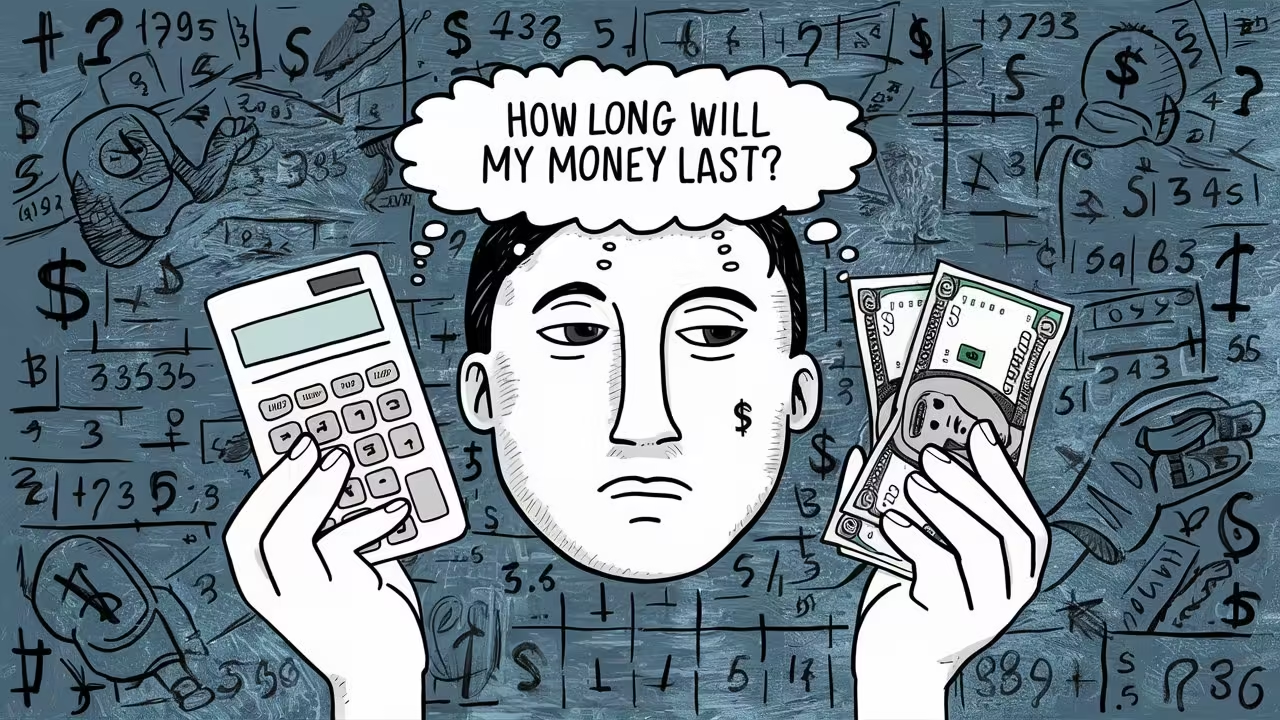Table of Contents
ToggleHow Long Will My Money Last? Comprehensive Retirement Lifestyle Planning Guide 101

Planning for retirement is a multifaceted process that requires careful consideration of many factors to ensure financial stability throughout your golden years. One of the most pressing concerns for retirees and those approaching retirement is understanding and managing the question: how long will my money last? This comprehensive guide delves into the intricacies of retirement lifestyle planning, providing you with the tools and knowledge necessary to secure your financial future.
Introduction
Retirement marks a significant transition from a life centered around work to one focused on personal pursuits, relaxation, and enjoying the fruits of your labor. However, this shift brings with it critical financial considerations. The central question often is, “how long will my money last?” Addressing this concern requires a thorough understanding of your financial situation, projected expenses, income sources, and effective management strategies. In this guide, we will explore various aspects of retirement lifestyle planning to help you confidently navigate this new chapter of life.
Understanding Your Retirement Goals
Defining Your Retirement Lifestyle
Retirement lifestyle planning starts with envisioning what you want your retired life to look like. Do you plan to travel extensively, pursue hobbies, or perhaps start a small business? Clearly defining your goals will help shape your financial plan and provide a roadmap for your retirement years.
Assessing Your Financial Situation
Before you can effectively plan for retirement, you need a clear understanding of your current financial situation. This involves calculating your net worth, including assets such as savings, investments, property, and any other valuable items, minus liabilities like mortgages, loans, and other debts.
Projecting Future Expenses
Estimating Living Expenses
Your day-to-day living expenses in retirement may differ significantly from your working years. Consider costs such as housing, utilities, groceries, transportation, and healthcare. It’s essential to create a detailed budget that reflects these anticipated expenses to ensure your retirement plan is realistic.
Healthcare Costs and Insurance
Healthcare can be a significant expense in retirement. Medicare may cover some costs, but it’s crucial to understand what out-of-pocket expenses you might incur. Consider supplemental insurance policies and long-term care insurance to mitigate these costs.
Travel and Leisure
If travel is a part of your retirement plan, estimate the costs associated with your desired destinations and frequency of trips. This will help you allocate funds appropriately and ensure you can enjoy your adventures without financial strain.
Income Sources in Retirement

Social Security Benefits
Social Security is a primary income source for many retirees. Understanding how benefits are calculated and the optimal age to begin claiming them is critical. Delaying benefits can increase your monthly payout, but personal circumstances will dictate the best strategy for you.
Pension Plans
If you have a pension, determine how much income it will provide and for how long. Some pensions offer survivor benefits, which can be crucial if you have a spouse who will rely on this income.
Retirement Savings Accounts
401(k)s, IRAs, and other retirement accounts are pivotal to your financial security. Develop a strategy for withdrawing funds, considering factors such as required minimum distributions (RMDs) and tax implications.
Investment Strategies for Longevity
Diversifying Your Portfolio
A diversified portfolio can help manage risk and ensure your investments continue to grow during retirement. Consider a mix of stocks, bonds, and other assets that align with your risk tolerance and financial goals.
Generating Passive Income
Passive income streams, such as dividends from investments or rental income, can provide a steady cash flow in retirement. Explore opportunities to create or enhance these income sources to supplement your retirement funds.
Adjusting to Market Fluctuations
Market volatility can impact your retirement savings. Develop a plan to weather economic downturns and protect your assets. This might include reallocating investments or having a cash reserve to avoid withdrawing from investments at a loss.
Tax Planning for Retirees
Understanding Tax Implications
Taxes can significantly impact your retirement income. Learn how different income sources are taxed and develop strategies to minimize your tax burden. This might include Roth conversions, timing of withdrawals, and utilizing tax-advantaged accounts.
State Taxes and Residency
State taxes vary widely, and where you choose to live in retirement can affect your overall tax liability. Some states have no income tax, while others tax Social Security benefits and pensions. Research the tax implications of potential retirement locations.
Estate Planning and Legacy

Creating a Will and Trust
Estate planning ensures your assets are distributed according to your wishes and can help minimize taxes and legal complications for your heirs. Consider setting up a will and possibly a trust to manage your estate effectively.
Designating Beneficiaries
Review and update beneficiary designations on all accounts, including retirement plans, insurance policies, and bank accounts. This step is crucial to ensure your assets are transferred smoothly and according to your wishes.
Gifting and Charitable Donations
Incorporating gifting strategies and charitable donations into your estate plan can provide tax benefits and allow you to support causes important to you. Understand the rules and limits on gifting to avoid unintended tax consequences.
Lifestyle Adjustments for Financial Stability
Downsizing and Relocating
Consider downsizing your home or relocating to a more affordable area to reduce living expenses. This can free up equity in your home and lower costs such as property taxes, maintenance, and utilities.
Part-Time Work or Consulting
Many retirees choose to work part-time or take on consulting roles to stay active and supplement their income. This can also provide a sense of purpose and help you stay engaged in your professional field.
Budgeting and Spending Wisely
Adopting a conservative spending approach can help ensure your money lasts throughout retirement. Track your expenses, avoid unnecessary debt, and prioritize spending on what truly matters to you.
Addressing Common Retirement Concerns
Longevity Risk
Outliving your savings is a common fear among retirees. Mitigate this risk by creating a comprehensive financial plan that includes strategies for managing expenses, generating income, and adjusting your lifestyle as needed.
Inflation and Purchasing Power
Inflation can erode the value of your savings over time. Consider investments that offer protection against inflation, such as Treasury Inflation-Protected Securities (TIPS) and real estate.
Health and Long-Term Care
Health issues and long-term care needs can significantly impact your finances. Plan for potential healthcare expenses and consider long-term care insurance to cover costs not included in Medicare.
Psychological and Emotional Aspects of Retirement
Maintaining a Sense of Purpose
Retirement can bring a sense of loss related to work identity and daily structure. Find activities that provide purpose and fulfillment, such as volunteering, hobbies, or continuing education.
Staying Socially Connected
Maintaining social connections is vital for mental and emotional well-being in retirement. Engage in community activities, join clubs or groups, and stay connected with family and friends.
Managing Stress and Anxiety
Financial concerns and lifestyle changes can cause stress in retirement. Develop healthy coping mechanisms, such as regular exercise, mindfulness practices, and seeking support from loved ones or professionals.
Planning for the Unexpected
Emergency Fund
An emergency fund is essential for covering unexpected expenses without derailing your retirement plan. Aim to have six months to a year’s worth of living expenses readily accessible.
Insurance Coverage
Review your insurance coverage, including health, home, auto, and life insurance. Ensure you have adequate protection and consider additional policies, such as long-term care insurance, if needed.
Legal Preparations
Ensure you have necessary legal documents in place, such as a power of attorney, living will, and healthcare proxy. These documents will protect your interests and ensure your wishes are followed in case of incapacity.
FAQs

How long will my money last in retirement?
The duration of your retirement savings depends on several factors, including your lifestyle, expenses, income sources, and investment strategy. Regularly reviewing and adjusting your financial plan can help ensure your money lasts as long as you need it.
What are the best ways to generate income in retirement?
Some of the best ways to generate income in retirement include Social Security benefits, pensions, withdrawals from retirement accounts, dividends from investments, rental income, and part-time work or consulting.
How can I protect my retirement savings from inflation?
Protect your retirement savings from inflation by investing in assets that typically outpace inflation, such as stocks, real estate, and Treasury Inflation-Protected Securities (TIPS). Maintaining a diversified portfolio can also help mitigate inflation risk.
What should I consider when choosing a place to retire?
When choosing a place to retire, consider factors such as cost of living, state taxes, climate, proximity to family and friends, healthcare facilities, and lifestyle amenities. Research potential locations thoroughly to ensure they align with your retirement goals and financial plan.
How can I reduce taxes on my retirement income?
Reduce taxes on your retirement income by understanding how different income sources are taxed, utilizing tax-advantaged accounts, timing withdrawals strategically, and considering Roth conversions. Consulting with a tax professional can help you develop an effective tax strategy.
What steps can I take to ensure my estate plan is in order?
Ensure your estate plan is in order by creating a will and possibly a trust, designating beneficiaries, and reviewing these documents regularly. Consider gifting strategies and charitable donations for tax benefits, and consult with an estate planning attorney to navigate complex legal issues.
How long will my money last in retirement?
The duration your money will last in retirement depends on several factors, including your spending habits, investment returns, and unexpected expenses. By carefully planning your budget and investment strategy, you can estimate how long your money will last. Tools like retirement calculators can help you project your finances and adjust your savings and spending to ensure longevity.
What are the best ways to ensure my money lasts throughout retirement?
To ensure your money lasts throughout retirement, consider the following strategies:
- Diversify your investments: Spread your money across different asset classes to reduce risk.
- Create a budget: Track your expenses and adjust as needed to avoid overspending.
- Delay Social Security benefits: Waiting until a later age to claim benefits can increase your monthly income.
- Plan for healthcare costs: Set aside funds for medical expenses and consider long-term care insurance.
- Reevaluate your plan regularly: Review and adjust your retirement plan annually to stay on track.
How does inflation affect how long will my money last?
Inflation erodes the purchasing power of your money over time, meaning you’ll need more money in the future to maintain the same standard of living. To combat inflation, invest in assets that typically outpace inflation, such as stocks, real estate, and Treasury Inflation-Protected Securities (TIPS). Regularly adjusting your retirement plan to account for inflation will help ensure your money lasts as long as possible.
Can working part-time in retirement help on how long will my money last?
Yes, working part-time can significantly help your money last longer. By earning additional income, you can reduce the need to withdraw from your retirement savings, allowing your investments to grow. Part-time work also provides structure and purpose, which can improve your overall well-being in retirement.
How do required minimum distributions (RMDs) impact how long will my money last?
RMDs are mandatory withdrawals from certain retirement accounts, such as traditional IRAs and 401(k)s, that must begin at age 73. These distributions can impact how long your money will last by forcing you to withdraw and pay taxes on a portion of your savings annually. To manage RMDs, consider strategies such as Roth conversions, which can reduce the amount subject to RMDs and potentially lower your tax burden in retirement.
How can I estimate how long will my money last?
Estimating how long your money will last involves projecting your future expenses, income sources, and investment returns. Use a retirement calculator to input your savings, expected Social Security benefits, pensions, and other income, along with your estimated expenses. This tool can help you determine if your current savings and investment strategy are sufficient or if adjustments are needed (how long will my money last).
What role does healthcare play in determining how long will my money last?
Healthcare costs are a significant factor in determining how long your money will last. Medical expenses tend to rise with age, and unexpected health issues can quickly deplete your savings. To prepare, consider purchasing long-term care insurance, maximizing your Health Savings Account (HSA) contributions, and setting aside a dedicated healthcare fund within your retirement plan (how long will my money last).
How can diversifying my investments impact how long will my money last?
Diversifying your investments spreads your money across various asset classes, reducing risk and increasing the potential for growth. A well-diversified portfolio can better withstand market fluctuations, helping to ensure your money lasts longer. Regularly review and rebalance your portfolio to maintain an appropriate mix of stocks, bonds, and other investments based on your risk tolerance and financial goals (how long will my money last).
How do market fluctuations impact how long will my money last?
Market fluctuations can significantly impact your investment returns and, consequently, how long your money will last. During market downturns, your portfolio value may decrease, forcing you to withdraw a larger percentage of your savings to cover expenses. To mitigate this risk, maintain a diversified portfolio, keep a cash reserve for emergencies, and avoid making impulsive investment decisions based on short-term market movements (how long will my money last).
How long will my money last if I live longer than expected?
If you live longer than expected, your money may run out sooner than planned. To prepare for a longer life, create a conservative retirement plan that assumes a longer lifespan and includes contingencies for unexpected expenses. Regularly review and adjust your plan to account for changes in your financial situation and life expectancy (how long will my money last).
How does my spending rate affect how long will my money last?
Your spending rate directly impacts how long your money will last. The more you spend, the faster your savings will deplete. To ensure your money lasts, adopt a sustainable spending rate, typically around 4% of your retirement savings annually. Adjust this rate as needed based on your investment returns, inflation, and changing financial circumstances (how long will my money last).
What is sequence of returns risk, and how does it affect how long will my money last?
Sequence of returns risk refers to the potential negative impact of experiencing poor investment returns early in retirement. If you encounter market downturns shortly after retiring, your withdrawals may deplete your savings faster than anticipated, reducing how long your money will last. To mitigate this risk, consider strategies such as maintaining a diversified portfolio, keeping a cash reserve, and using a dynamic withdrawal strategy that adjusts based on market performance (how long will my money last).
How can delaying Social Security benefits impact how long will my money last?
Delaying Social Security benefits can increase your monthly income, potentially helping your money last longer. For each year you delay claiming benefits beyond your full retirement age, your monthly benefit increases by about 8%, up to age 70. This higher income can reduce the need to withdraw from your savings, allowing your investments to grow and last longer (how long will my money last).
How does tax planning affect how long will my money will last?
Effective tax planning can help your money last longer by minimizing the amount you owe in taxes. Strategies such as Roth conversions, timing withdrawals to stay in lower tax brackets, and utilizing tax-advantaged accounts can reduce your tax burden and preserve more of your retirement savings. Consult with a tax professional to develop a personalized tax strategy (how long will my money last).
How long will my money last if I face unexpected expenses?
Unexpected expenses, such as medical emergencies or home repairs, can quickly deplete your savings. To ensure your money lasts, build an emergency fund with six months to a year’s worth of living expenses and consider insurance policies, such as health, home, and long-term care insurance, to cover potential costs. Regularly review and update your financial plan to account for these uncertainties (how long will my money last).
Conclusion
Planning for retirement is a dynamic and ongoing process that requires careful consideration of various financial, lifestyle, and emotional factors. By addressing the question “how long will my money last?” and implementing comprehensive strategies, you can enjoy a fulfilling and financially secure retirement. Regularly reviewing and adjusting your plan, staying informed about financial trends, and seeking professional advice when necessary will help you navigate the complexities of retirement and make the most of your golden years.
For more information regarding Finance Basic you can visit FinancewithAi Channel & Home
Share this:
- Click to share on LinkedIn (Opens in new window)
- Click to share on Reddit (Opens in new window)
- Click to share on Tumblr (Opens in new window)
- Click to share on Pinterest (Opens in new window)
- Click to share on Pocket (Opens in new window)
- Click to share on Telegram (Opens in new window)
- Click to share on Threads (Opens in new window)
- Click to share on WhatsApp (Opens in new window)
- Click to share on Mastodon (Opens in new window)
- Click to share on Nextdoor (Opens in new window)
- Click to share on Bluesky (Opens in new window)